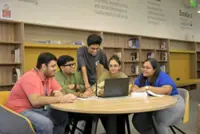BEING in a university with a close-knit, global network of campuses has wondrous advantages when it comes to expanding one’s world-view.
Even more paradoxical is how this advantage was more deeply felt during the pandemic and ensuing lockdowns across countries.
If not for the lockdowns, Kezzia Leong might never have had the chance to engage with
her fellow students in Dubai and Hong Kong.
With classrooms and lecture halls around the world closed and undergraduates staying home to keep safe, educators had to be creative to ensure the learning and teaching did not come to a grinding halt.
University of Wollongong (UOW) employed technology and its network of campuses around the world to good effect.
Leong, who is the student council president of UOW Malaysia KDU, had the honour of joining her local campus mates to engage in a moderated dialogue through video conferencing with UOW students in the Dubai and Hong Kong campuses.
The dialogue led the students to discuss pressing global issues: diversity and inclusivity; inequality; racism and social stereotyping.
What Leong and her mates were not prepared for was the stark realisation of how differently people in different corners of the world could have such contrasting views on the same subject.
Being a Malaysian used to a multiracial, multicultural society, Leong recalls how strongly her Hong Kong counterparts, for example, felt about the freedom of expression and police brutality.
As for the issue on LGBT (lesbian, gay, bisexual, transexual) freedom, her counterparts from Dubai and their strong views against it took her aback.
“It was eye-opening. You get to know them better, what their views are like. It is good to listen and put ourselves in other people’s shoes,” she said.
The dialogue, which took place over several days, led Leong to gain insights into the nuances of being a global citizen.
“The mindset of being a global citizen requires us to avoid viewing each other from the perspective of our own races, genders, religious beliefs or cultures.
“There are so many differing opinions and it is crucial for us to understand the other side. We may not agree, but we need to understand each other.
“That is the key to creating a peaceful world,” she said.
Although his major was in data science, the 22-year-old was roped into a two-week long dialogue with students across the Asia Pacific to discuss cross-border challenges in achieving the United Nations’ Sustainable Development Goals (SDG).
Adopted by all UN members in 2015, the 17 SDG are calls for action to all countries, a shared blueprint of peace and prosperity.
With lecturers guiding the discussions and sharing sessions from industry and community leaders around the globe, Chua and the other students delved into global problems beyond the confines of their own communities.
“There are so many different views, especially between those from the developed countries and those from the developing countries, like me. You will see the gap,” he said.
But Chua’s sessions were not all heavy discussions. He teamed up with Japanese and Korean students from UOW Australia and through their video conferencing, one of the Japanese students invited them to join their cooking session, in which he fondly remembers learning a new recipe.
Chua’s group was tasked with working out solutions for the ninth SDG of ‘Industry, Innovation and Infrastructure’.
Being the only student in the team who is from a developing country such as Malaysia, Chua recalls how empathetically he pressed on the issue because his counterparts were from developed nations, where the infrastructure was largely more advanced.
After two rewarding weeks, Chua’s group boiled the priority down to the importance of access to the internet and computer technology for everyone in the world as being the most crucial element for achieving the ninth SDG on a global scale.
“While I’m a computer science student, I value the chance to discuss such a critical issue with people from around the world.
“It was something I never dreamed of being able to do,” he added.
The treasured experiences of Leong and Chua are shared by many UOW Malaysia KDU students through regularly held global exchanges.
“That’s the good thing about being in a university with campuses in many cities,” said campus senior manager Mitchell Liong, who is in charge of the Student and Alumni Centre.
UOW campuses are in Glenmarie, Selangor; George Town and Batu Kawan in Penang; Wollongong and Sydney in Australia; Dubai in the United Arab Emirates and Hong Kong.
Beyond the cross-border networking perks for all the student bodies, students enjoy the full benefits of a world-class education.
For example, when a student is accepted into a degree programme in UOW Malaysia KDU, the student automatically receives an offer to study in UOW Australia, granting students the prestige of being accepted into a public university in Australia.
Founded 1951, UOW is in the top 1% of world universities and is rated number one in New South Wales for undergraduate skills development.
Liong said UOW Malaysia KDU students who opt to complete their bachelor degrees entirely in Malaysian campuses will still benefit from its dual award programmes.
“Graduates are awarded two degree certificates, from UOW Australia and UOW Malaysia KDU.
“Such a privilege is vital for them when it is time to join the workforce,” he added.
Whichever UOW campus students choose to study from, Liong said unflagging efforts are taken to ensure the famed Australian quality of education is given to them.
“We have a special focus on ensuring that students assimilate themselves with industry-relevant knowledge.
“In many fields, technology changes how things are done in less than a year, so our lecturers, some of whom are industry experts themselves, constantly update the syllabus to ensure that students graduate with the latest set of skills at hand,” Liong said.







